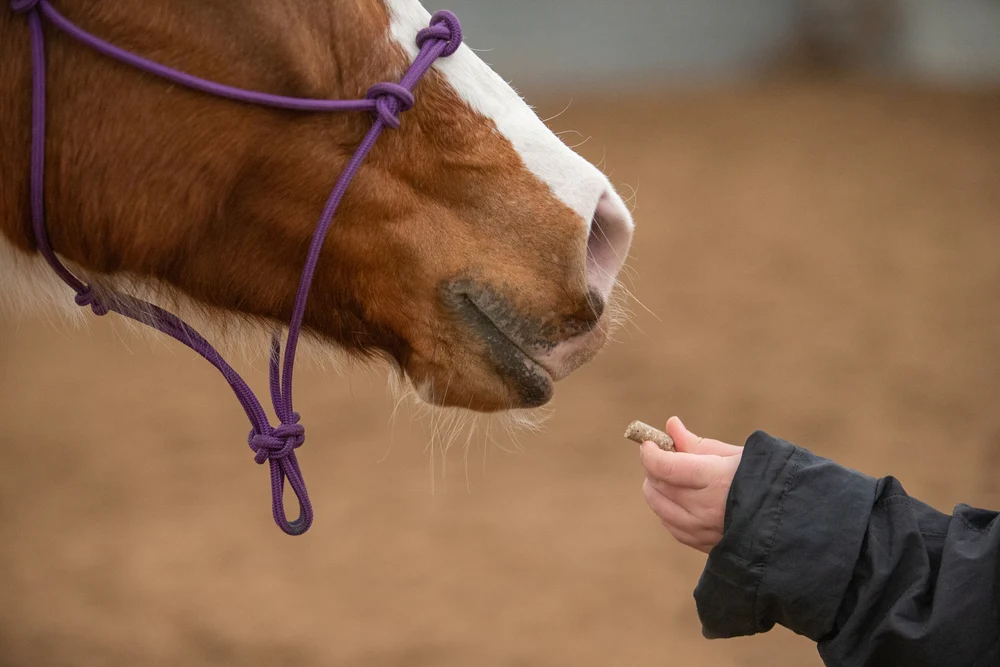Introduction
Gut health in horses is an crucial however frequently neglected problem of equine care. From regular typical performance issues to conventional pain, digestive troubles can appreciably effect your horse’s normal fitness. Understanding the significance of gut fitness, spotting symptoms of digestive issues, and know-how the way to keep a healthful gut can ensure your horse lives an prolonged, healthy, and comfortable lifestyles.
Understanding Gut Health in Equines
The Equine Digestive System: A Unique Approach
Horses have a specialized digestive gadget that differs appreciably from that of different animals. The equine digestive tract is designed to manner huge quantities of fibrous fabric like grass and hay. Understanding the form of this device is high to appreciating the complexity of intestine health in horses.
- Mouth and tooth: The first factor of digestion in a horse is their way of chewing meals into small bits with the teeth. Saliva from the wealthy enzyme begins to interrupt down carbohydrates into sugars.
- Esophagus: Food travels from mouth-to-belly via this tube, the esophagus. Interestingly, horses can simplest swallow meals in a single direction due to a first rate sphincter at the pinnacle in their belly.
- Stomach: Horses have enormously small stomachs for his or her length, which means that they ought to devour frequently to avoid digestive troubles. The belly secretes acid to break down food however has limited potential for garage.
- Small Intestine: The small intestine, approximately 70 ft prolonged, is in which most nutrient absorption takes vicinity. It absorbs proteins, fats, and carbohydrates, but it is able to be crushed by using way of surprising nutritional adjustments.
- Cecum & Large Colon: The cecum, often called the “hindgut,” is in which fiber is fermented thru micro organism to supply useful fatty acids. The big colon also aids in fermentation and absorption.
The Role of Microflora in Equine Digestion
Microflora—bacteria and microbes dwelling inside the gut—are critical for breaking down fiber and changing it into nutrients that horses can soak up. These microorganisms play a crucial role in fermentation, particularly within the cecum and colon. Imbalances in gut bacteria can result in digestive disturbances, it’s miles why retaining a healthful microbiome is essential.
- Beneficial Bacteria: These microbial organisms belong to the intestine, help in digestion of cellulose, and assist inside the manufacturing of nutrients, and aid inside the immune tool functioning.
- Harmful Bacteria: These unwanted microbes motive illnesses like colic or hindgut acidosis once they develop excessively in variety.
Common Digestive Disorders in Horses
Colic: A Leading Digestive Concern
Colic is one of the maximum commonplace and critical digestive disorders in horses, from minor discomfort to lifestyles-threatening emergencies. Colic is the commonplace call for stomach pain and can be caused by numerous elements, such as diet, stress, or parasites.
Types of Colic:
- Spasmodic Colic: Caused by means of manner of muscle spasms within the intestines, often related to stress or sudden changes in weight loss program.
- Impaction Colic: A blockage in the intestines due to insufficient water intake, terrible-extraordinary forage, or sudden adjustments in weight loss plan.
- Gas Colic: Excessive gasoline bring together-up within the intestines, regularly due to fermentation issues.
Symptoms of Colic:
- Rolling or thrashing on the floor
- Sweating and restlessness
- Lack of appetite and reduced manure manufacturing
- Elevated coronary coronary heart fee and respiration
Gastric Ulcers: A Silent Threat to Gut Health
Gastric ulcers are a not unusual but often undiagnosed hassle in horses. Ulcers rise up at the same time as the belly lining is damaged with the aid of manner of stomach acid, maximum crucial to contamination and pain. Horses in heavy art work or the ones which might be pressured are in particular vulnerable to ulcers.
Causes of Gastric Ulcers:
- Excessive belly acid because of restricted grazing or immoderate-pressure degrees.
- Feeding too much grain, with a view to increase acid manufacturing.
- Lack of fiber in the diet, which buffers stomach acid.
Symptoms:
- Poor urge for meals
- Weight loss or terrible state of affairs
- Behavior changes, along with irritability or aggression
- Decreased general performance in paintings or education
Hindgut Acidosis: A Growing Problem
Hindgut acidosis takes location whilst there may be an imbalance within the microbial populace of the horse’s cecum and colon, leading to a drop in pH. This state of affairs can give up end result from surprising nutritional changes, immoderate grain intake, or pressure.
Causes of Hindgut Acidosis:
- High starch and sugar diets that ferment too short in the hindgut.
- Lack of fiber, that is crucial for slow fermentation and proper digestion.
Symptoms:
- Diarrhea or loose stools
- Poor urge for food and weight loss
- Reduced energy ranges
Preventing Digestive Problems in Horses

Key Dietary Practices for Optimal Gut Health
Maintaining a right eating regimen is crucial for keeping your horse’s digestive system functioning with out issues. Here are a few key practices to comply with:
- Provide Plenty of Fiber: Horses need a high-fiber food plan to preserve healthful gut feature. Hay and pasture should make up the bulk in their food plan.
- Gradually Introduce Changes: Sudden adjustments in food plan, together with switching grains or nutritional dietary supplements, can disrupt the intestine’s microbial balance. Always introduce new food little by little.
- Avoid Overfeeding Grains: While grains provide strength, an excessive amount of starch can purpose digestive troubles. Limit grain intake and offer it in small, frequent meals.
- Use Slow-Feed Hay Nets: These assist simulate natural grazing, encouraging horses to consume slowly, which reduces the hazard of colic and ulcers.
Probiotics and Prebiotics: Supporting Equine Microflora
Probiotics and prebiotics can assist hold a wholesome stability of gut bacteria. Probiotics introduce beneficial micro organism, on the identical time as prebiotics feature meals for the ones bacteria, selling their increase.
When to Use Probiotics:
- After antibiotic remedy
- During times of strain or nutritional trade
- For horses with digestive troubles like colic or ulcers
Popular Supplements:
- Probiotic Pastes and Powders: These are easy to manage and can speedy restore intestine health after a disruption.
- Prebiotics: Often covered in feed formulation, they assist preserve the boom of beneficial bacteria inside the hindgut.
The Role of Hydration in Gut Function
Proper hydration is vital for keeping gut health. Water is critical for digestion, nutrient absorption, and stopping dehydration-related situations like colic. Always make certain your horse has regular get right of entry to to easy water, specially in a few unspecified time in the destiny of warm climate or heavy exercise.
Signs of Dehydration:
- Reduced urge for food
- Dry gums and sunken eyes
- Dark, targeted urine
Recognizing Signs of Digestive Trouble in Horses
Behavioral and Physical Symptoms of Digestive Problems
Digestive issues regularly seem as changes in conduct or bodily signs. It’s crucial to understand the ones symptoms early to save you more essential problems:
Behavioral Signs:
- Restlessness or pawing on the ground
- Decreased social interaction or reluctance to move
- Increased aggression or irritability
Physical Symptoms:
- Changes in manure consistency (diarrhea or dry, hard stools)
- Swelling within the belly
- Sweating or panting
When to Call the Veterinarian
Some digestive troubles, which includes colic or excessive gastric ulcers, require proper away veterinary attention. If you be aware any of the following symptoms and signs, it’s crucial to the touch your vet:
- Persistent ache or discomfort
- Lack of manure manufacturing for more than 12 hours
- Signs of excessive colic (rolling, thrashing, sweating)
- Weight loss or reduced typical overall performance regardless of a normal weight-reduction plan
Maintaining Long-time period Gut Health in Horses
Regular Check-usaand Monitoring
Regular veterinary take a look at-united statesand digestive tracking are critical to make sure prolonged-term intestine fitness. Your vet can perform fecal exams, blood checks, and different diagnostics to display the health of your horse’s digestive tool.
- Preventative Care: Scheduling everyday check-u.S.A. Of americacan help select out issues earlier than they grow to be intense problems.
- Fecal Tests: These checks can discover parasites, bacteria, or great issues that would be affecting intestine fitness.
Managing Stress and Its Impact on Gut Health
Stress can negatively effect a horse’s digestive device. Horses are prey animals and are quite touchy to their surroundings. Managing stress via proper turnout, coping with, and normal is essential for gut fitness.
Stress Reduction Tips:
- Consistent turnout and access to pasture
- Avoiding surprising modifications in ordinary or surroundings
- Providing intellectual stimulation thru exercise and interplay
FAQ
What are the most commonplace digestive issues in horses?
- Colic, gastric ulcers, and hindgut acidosis are the most common problems affecting horses.
How can I enhance my horse’s intestine health sincerely?
- Focus on a excessive-fiber weight loss plan, make certain access to water, and introduce probiotics and prebiotics whilst wished.
How can I tell if my horse has a digestive hassle?
- Look for behavioral modifications, decreased urge for meals, outstanding stool, or signs and symptoms and signs and symptoms and signs and symptoms of ache.
Are there any dietary nutritional supplements that help gut fitness in horses?
- Probiotics, prebiotics, and digestive enzymes are commonly used to aid intestine fitness.
Can intestine health have an effect on my horse’s universal overall performance?
- Yes, terrible intestine health can purpose fatigue, discomfort, and reduced common performance in art work or education.
Conclusion
Gut health is foundational for your horse’s not unusual properly-being. By maintaining a balanced food plan, monitoring their digestive device, and using dietary supplements at the equal time as important, you could help your horse thrive. Regular check-u.S.And stress control will further make certain their digestive device stays in peak circumstance.









